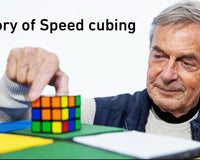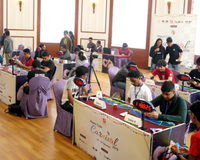Bhargava Narasimhan, a doctor of pharmacy, definitely has golden fingers with a passion for cubing! Born and raised in Chennai, this cuber formerly held the Asian record for a single of the 3x3x3 one-handed with a solve time of 9.52 seconds. He also held the Asian record for an average of five one-handed solve by solving it in 13.00 seconds!
He has also formerly held national records for 2x2x2 average, 4x4x4 average, Fewest Moves challenge, Megaminx single and average, and Skewb average. But that's not all!! Narasimhan was the first Indian to be ranked in the top 100 in the world in some of these events.
Narasimhan is a recognized name in the world of speedcubing. The team at Cubelelo caught up with him to know more about his cubing experience and why he encourages everyone to cube! Here are a few excerpts.
Reminiscing when he was introduced to the world to cubing, Bhargava says, "Post 2017, while I was applying to colleges and preparing for interviews, I realized there was a lot of overlap between what most corporate/ universities expect out of a candidate and what we all have learned in cubing without actually realizing it. I also realized there was very little discussion in this space since most of us perform these things as if they are second nature to us and hence, this thread. Although this list is extensive, it is in no way exhaustive."
Narasimhan made the most of his developing skills. He says, "I mostly had these as hints and developed them during interviews. I have managed to crack every single interview I have been called for and currently working with a major Healthcare company."
He shares a few tips on how cubing impacts decision-making and other skill sets, especially for those who are shaping career paths. Narasimhan says there are 22 ways by which cubing can help in skill development. Here is what he had to say -
1. Feynman technique
The Feynman technique is one such technique that can be explained as a 4 step process: choose a concept - > teach someone - > identify gaps in knowledge - > review, simplify and continue.
Most of us film ourselves, do a lot of self-critique and go forth with targeting those gaps. We also try to grasp the basic understanding of a new method /concept, work on it further and refine/ optimize it as we practice.
This is a modified version of Feynman's technique, and most companies appreciate this self-appraisal process. This also shows most of us, cubers, have a decent understanding of self-realization, which is also lauded.
2. Adaptability
Each and every single competition you attend might have a new venue you have never been to, a new atmosphere you have not gotten acclimatized to, and new challenges you did not prepare for. We, cubers, need to adapt to any new environment as soon as possible and get into our zones quickly. This has toned our instincts to adapt and perform, something companies expect from their employees.
3. Mutual growth
We understand the need for helping the community grow by contributing. Be it a new trick, new method, fun finger-trick, we have not shied away from posting it public, so someone else could nourish it with new perspectives. The world has enough people who are constantly trying to keep things to themselves, fearing running out of their USP, but we very well understand helping peers helps us grow.
4. Unlearning and relearning
All of us started with methods that might not have been good enough to pursue after landmark times and had to relearn something else. We have had finger-tricks and lines of thoughts that we are used to so much, but when we see more potential in something new, we have been flexible about switching to those. Your company might be running on primitive tech; guess who isn't going to shy away from change?

5. Knowing the best method
Be it any problem (scramble), the ones who are the best tend to flow with the art. We understand it is good to know a lot of methods to solve problems, but the best one is to not have any, "Be like water, my friend" is something we do on a daily basis.
6. Valuing someone's time
I always understood showing up on time is mandatory to avoid being disqualified, so much so that it has become a practice for me to go to places a little early. This also makes the other person feel valued and adds more to my reputation.
Related Read - How to Solve Rubik's Cube - Beginners Method
7. Accentuating the type-A in us
Due to the innate spirit of competitive cubing, cubers tend to resonate towards being a type-A personality. We tend to look at all hurdles thrown our way as a challenge, set competitive goals for ourselves, and enjoy constantly chasing ambitious targets. We also tend to be much more organized, to not waste time.
8. High-pressure situations
Being a successful cuber also involves showmanship. Most of us have faced media, delivered speeches, been part of Live TV interviews, and been victims of enthusiastic pressurizing crowds. This also means we have constantly explored what works best for us in trying to keep calm and are adept at handling pressure.
9. Operating in good faith
"I have never met a group of people than the cubing community that is just a perfect representation of the utopian world".
- Shwan Park
There are very few sports where you find the competitor penalizing themselves because they know they deserve the penalty. Some of these instances might snatch our chance at a podium, but we do realize operating in good faith comes a long way.
10. Patient
"Embracing the suck is one crucial element when you begin any art."
- Mastery, Robert Greene
We know that learning a new event/ method/ technique is going to slow us all down and demotivate us. But we also know the same is applicable for anything new we begin with. This means we spring back faster since we are familiar with the pattern of progress here.
11. Goal-oriented
We always function with a short-term and a long-term goal in mind. Almost each and every practice session that we grind, we push ourselves towards the short-term goals for the day/ week to get closer to our long term goals (Long term - WR, short term - sub 10, sub 8, getting comfortable with a method, etc.,)

12. Peer influence
The cubing community is filled with students from major institutes of the world. We have had people representing their nation at high-level power-lifting events to play music at Grammy Awards. This means we always tend to strive for greatness and not settle for anything mediocre, thanks to the peer community.
13. Time management
Being a type-A personality automatically forces us to balance multiple things at once, and hence, we tend to naturally be good at time management. Most of us tend to juggle studies, cubing, career goals, music, and fitness pretty well.
14. Appreciate diversity
"...the most amazing thing in cubing is that everyone is accepted. "
- Patrick Ponce
Speedcubing opens up avenues to go to new countries and meet people you might not come across if not for the sport. Most online discussions on a daily basis also happen with people from other nationalities, and we understand the background/ culture/ race/ nationality/ religion has nothing to do with how one performs. Appreciating diversity is second nature for all of us, and the opportunities to meet new people while working for major organizations is only going to make us more sensitive towards cultures and remove our unconscious biases.
Read More - 13 Benefits of Solving Rubik's Cube
15. Open to learning
The community is always open to new ideas regardless of a person's speed/ age/ gender. There have been multiple instances when people who have much slower averages have come up with amazing techniques, and we have learned to appreciate what it is worth.
16. Willingness to fail
We cubers realize not everything new we try, fetches success. We learn to accept failure as part and parcel of experimenting with the sport and embrace failures day in and day out.
17. Giving comebacks
Resilience is one trait the community teems with. There have been innumerable instances of us losing records, getting counted out, having down periods, and backing ourselves up just to prove everyone wrong and springing with comebacks.
18. Organizing
It's a great activity to be a part of organizing teams. Right from an elevator pitch with the sponsors to ensuring things are in place, scheduling, finding the right person for the right job, we have done it all.
19. Volunteering
"All major communities/ sports have people that are paid to run it. They are people who work a full week in those jobs. Cubing is a sport where everything is done on a 100% volunteering basis ".
-Kit Clement
There have been instances of selfless contributions from various volunteers, delegates, and parents, all to push this happy community further.
20. Becoming good linkers
Owing to the nature of the sport, we realize most events we practice are spill-over events. We tend to play around to see if we could use skill one acquired in an event in event 2.
Similarly, we also try to constantly look for how transferrable the skills we learn are and the tools we use could be, constantly looking for inspiration (magnetic cubes, non - Newtonian lubricants, paced breathing techniques, to name a few).
21. Understanding the need for practice
Since cubing is one of those very sports where progress can be easily measured in quantitative terms for each skill added/ practice session done, we tend to understand the need for practice much better.
22. Miscellaneous
Trivial things messing with - sending emails, resolving disputes, sticking to basics under pressure, commuting to new places comes easy to us. Also, striking up conversations with strangers and making new friends is something we always enjoy.
In a concluding note, Narasimhan says, "In addition to the above content, cubing also has many well-known benefits as it increases long-term and short term memory, spatial intelligence, hand-eye coordination, enhanced cognitive ability, decision making and problem-solving ability and many more that you will learn through the process. This shows that cubing is beneficial for everyone, whether you are young or old."
Read More- Benefits Of Solving Puzzles For Your Brain
Thank you, Narasimhan, for your time and for inspiring young minds. We wish you all the best in your future cubing journey.
So, what are you waiting for? If you want to be the next speedcuber, your time is now. Head over to Cubelelo to know more about the world of Cubing!
































2 comments
Sanidhya Goswami
Loved this article!
Looking forward to more
Abhijeet Deepak Ghodgaonkar
Great article. Loved it, when I saw it first on SS Forum in 2019.